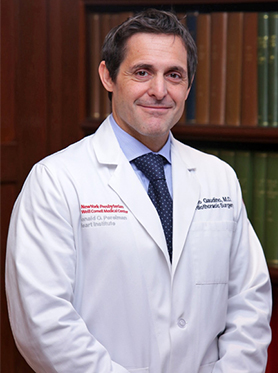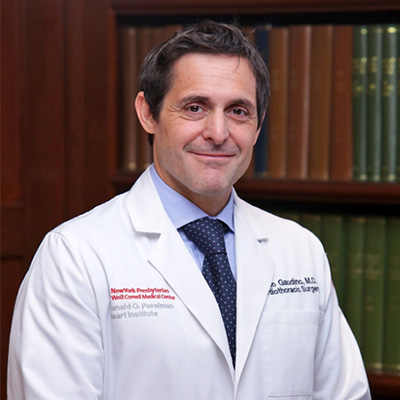A new analysis by Weill Cornell Medicine and NewYork-Presbyterian investigators has shown that while a combination of two antiplatelets drugs can benefit patients after coronary artery bypass graft (CABG) surgery, it also increases the risk of potentially dangerous bleeding. This double-edged finding suggests physicians should carefully weigh the use of these medications after this procedure.
Dr. Mario Gaudino
A team led by Mario Gaudino, MD, PhD, a cardiothoracic surgeon at NewYork-Presbyterian/
The results of this study indicate physicians should base their decisions on patients’ individual circumstances and avoid using dual antiplatelet therapy for those with conditions that put them at risk of bleeding.
Taken together, these results indicate physicians should base their decisions on patients’ individual circumstances and avoid using this approach for those with conditions that put them at risk of bleeding, notes Dr. Gaudino, who is also Director of the Joint Clinical Trials Office at Weill Cornell Medicine and NewYork-Presbyterian.
Every year, approximately 300,000 patients undergo coronary artery bypass grafts to treat narrowed or blocked arteries. In more than 90 percent of these procedures, surgeons take a graft from one of the patient’s saphenous veins, however, within a year, as many as a quarter of these grafts become obstructed. Some studies have examined the benefit of giving patients dual antiplatelet therapy (DAPT), however, these studies were small and came to conflicting conclusions.
The Weill Cornell Medicine team reached out to researchers on four such randomized clinical trials to obtain access to their raw data. The investigators then compiled that data comparing the effects of ticagrelor DAPT or ticagrelor monotherapy versus aspirin on saphenous vein graft failure, creating a much larger study capable of generating more robust conclusions.
The study, which included 1,316 patients and 1,668 saphenous vein grafts, found:
- Of the 871 patients in the primary analysis, 435 received ticagrelor DAPT and 436 received aspirin
- Ticagrelor DAPT was associated with a significantly lower incidence of saphenous vein graft failure (11.2 percent) per graft than was aspirin (20 percent) and was associated with a significantly lower incidence of saphenous vein graft failure per patient (13.2 percent versus 23.0 percent)
- Ticagrelor DAPT was associated with a significantly higher incidence of BARC (Bleeding Academic Research Consortium) 2, 3, or 5 bleeding events (22.1 percent) than was aspirin (8.7 percent)
- Compared with aspirin, ticagrelor monotherapy was not significantly associated with saphenous vein graft failure (19.3 percent vs 21.7 percent)
In summary, the Weill Cornell Medicine researchers found a failure rate of approximately 11 percent in patients who received a combination of aspirin and ticagrelor, while blockages occurred in 20 percent of grafts when patients received only aspirin. However, as compared with aspirin alone, DAPT brought on more bleeding events that, while generally not life-threatening, required medical attention.
In these previous trials, patients received DAPT for a full year. However, most graft failure occurs in the first few months after surgery. Next, Dr. Gaudino plans to test aspirin and ticagrelor over one to three months to see if a shortened course offers the same benefit with less risk of bleeding.





